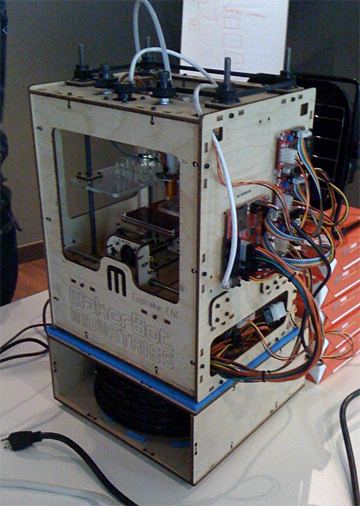 On Thursday I hosted a Lunch & Learn presentation on 3D Printing and Rapid Prototyping.
On Thursday I hosted a Lunch & Learn presentation on 3D Printing and Rapid Prototyping.
Rapid Prototyping (a.k.a. 3D Printing) has been used commercially since the early ’80s as a way of speeding up and simplifying the development process of products such as cars, computers and other consumer goods. Industrial grade 3D printers cost tens of thousands of dollars, but now anyone can buy a relatively inexpensive one and print objects at home.
I brought in my Cupcake 3D printer — purchased as a kit from Makerbot for about $1,000 — to the office and demonstrated printing out a simple 3D object. Currently personal 3D printing is at about the same stage in its development as home computers were in the mid ’70s: If you wanted a computer you had to purchase a kit, build it and program it yourself. While a personal printer like the Cupcake is relatively crude in the quality of the objects it can print out and limited in the materials it can print with, the open-source nature of the technology is helping it to evolve rapidly. Early adopters have formed communities to share their knowledge, their designs for open-source objects, their improvements to their printers and their enthusiasm. Personal 3D Printing is becoming popular and newsworthy, with stories appearing on mainstream media such as CNN and the BBC.
3D Printing is quickly growing into a paradigm shift in how we manufacture, distribute and maintain legal rights to physical items…including our bodies.
The medical and dental industry is one of the biggest users of 3D printing, creating items such as wax-ups to create moulds for hearing aids and prosthetic limbs. But the bleeding edge of medical research is printing live cells onto support structures to create organs, such as a liver or heart. In the not-too-distant future we may no longer have waiting lists for people who need organ replacements, at least for people who can afford to have a new one printed.
Put your thinking caps on, because the ethical and legal issues that this potentially disruptive technology will raise is something that humankind will soon be challenged to find answers for.